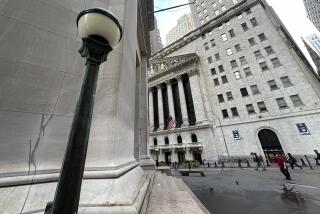TOP STORIES -- Jan. 16-21
- Share via
Markets End Lower for Third Straight Week
The Dow Jones industrial average and other key stock market indexes faltered after an early rally Friday, continuing with their third straight weekly losses to kick off the year.
Economic factors are dragging down the market, analysts said. Higher energy prices and expectations of higher interest rates along with weaker corporate profit growth are making investors nervous about equities, they said.
And after the market’s big run-up late last year, investors are unloading to lock in profits.
For the week, the Dow dropped 1.6% to 10,392.99. The broader Standard & Poor’s 500 fell 1.4% to 1167.87.
The Nasdaq composite index fell 2.6%. The technology-heavy Nasdaq hit a 10-week low of 2,034.27, having given up almost 3% in the last two sessions.
*
FCC Chief Powell Plans to Step Down in March
Federal Communications Commission Chairman Michael K. Powell, a champion of digital technology whose four-year tenure has been marked by controversies over indecency on the airwaves and the easing of media ownership restrictions, said he would step down in March.
Powell, 41, sent a letter Friday morning to President Bush, who appointed the former Army officer and antitrust lawyer to the job in 2001.
In a statement, Powell said that he had “completed a bold and aggressive agenda” but added that his resignation came “with a mixture of pride and regret.”
Powell’s departure was first revealed on the Wall Street Journal’s editorial pages Friday.
Republican FCC Commissioner Kevin J. Martin is considered the leading candidate for Powell’s job.
*
Foreign Investors Unfazed by Weak Dollar
The sinking U.S. dollar, instead of scaring foreign investors away from U.S. assets, may have instead whetted their appetite.
Foreigners pumped a net $81 billion into U.S. stocks and bonds in November, up from $48.3 billion in October and the most since June, the Treasury Department said in a report.
Foreigners’ net purchases of U.S. stocks totaled $14.5 billion in November, the report said.
Net purchases of Treasury bonds by foreign investors rose to $32 billion for the month from $20.8 billion in October. Corporate bonds and government issues also were snapped up.
Even as foreigners bought more U.S. securities in November, many Americans were headed overseas: U.S. investors’ net purchases of foreign stocks and bonds totaled $18.7 billion for the month, the most since mid-2000, Treasury data show.
*
L.A. Location Shoots Rise Sharply in 2004
More movies, television shows, music videos and commercials were shot in public spaces across Los Angeles County in 2004 than ever before.
The Entertainment Industry Development Corp. issued permits for 52,707 location production days, up 19% from 2003.
Production days for TV shows alone jumped 27%, nearly half of that for “reality” programming.
The EIDC issues permits for Los Angeles and much of the county, though not some cities, including Burbank and Long Beach.
In 2004, production days for feature films, including “Million Dollar Baby” and “Collateral,” were up 19%, reversing an eight-year decline. Feature film permits totaled 8,707 days.
The biggest increase was for TV shows. Television production rose to 18,257 days, driven by reality shows and scripted dramas.
*
Charter CEO Quits With Year to Go on Contract
In the latest upheaval at the nation’s third-largest cable TV provider, Charter Communications Inc. replaced its chief executive.
Carl Vogel resigned three years into his four-year contract, which would have expired at the end of December.
Succeeding the veteran pay-TV executive is Robert May, 55, a Charter director who has relatively little experience in the industry but is credited with reviving HealthSouth Corp. May will serve as interim CEO until a successor for Vogel can be found.
Under Vogel, the company missed financial targets and lost subscribers to satellite TV rivals in 10 of the last 11 quarters.
May said he hoped to more aggressively roll out services, including telephone and video on demand, that other cable operators have used to curtail migration of subscribers to satellite.
*
Venture Investments Climb in Nation, State
Reversing three years of declines, venture capital investments in new and growing companies rose 8% nationwide and 7% in Southern California last year, according to a report.
The increases, experts said, suggest a generally healthier economy. “This bodes well for entrepreneurs,” said Don Williams, a venture capital advisory group leader with consulting firm Ernst & Young, which prepared the report with research firm VentureOne.
Also boosting the numbers were a flurry of corporate acquisitions and a rebound in the market for initial public offerings.
The report said U.S. venture capital investment climbed to $20.4 billion in 2004, compared with $18.9 billion in 2003. The number of deals fell 1% to 2,067.
In Southern California, companies raised $2 billion in 2004, up from $1.9 billion in 2003. The number of financings slipped to 174 from 198 in 2003, when the average deal size was smaller.
*
Actors, Studios Agree on Three-Year Contract
Actors and Hollywood’s major entertainment companies reached agreement on a three-year contract, averting a production slowdown that could have started as early as this month.
Under the $200-million pact, actors’ pay is increased across the board, but they do not gain a bigger share of DVD revenue.
Although the contract does not expire until June 30, actors and producers feared that uncertainty over a possible strike might cause studios to start shelving coming projects.
The Screen Actors Guild and the American Federation of Television & Radio Artists gained a 9% raise over three years for 140,000 performers. Members must ratify the deal.
Studios represented by the Alliance of Motion Picture & Television Producers had conveyed to negotiators that they would absorb a strike rather than budge on the DVD issue.
*
Marvel Is Ordered to Pay Comics Icon Stan Lee
Marvel Enterprises Inc. was told it owes comic book icon Stan Lee 10% of profit it has received since November 1998 for films based on Spider-Man and other superheroes Lee created.
Lee could be entitled to tens of millions of dollars, considering the success of the films “Spider-Man” and “Spider-Man 2,” said his attorney, Howard Graff.
Marvel will appeal the ruling and “continue to contest vigorously the claims on which the court did not rule,” general counsel John Turitzin said.
One of those claims involves whether Lee is entitled to money made from merchandising deals with Sony Corp. for “Spider-Man” and with Universal Studios for “Hulk,” Marvel said.
Lee sued Marvel in November 2002, maintaining that he was being shortchanged. U.S. District Judge Robert Sweet in New York ruled in Lee’s favor.
*
EBay Profit Jumps 44% but Outlook Lowered
Online auctioneer EBay Inc. said fourth-quarter profit and revenue rose 44%, causing merchandise sellers rankled by a rise in listings fees to claim EBay was growing at their expense.
San Jose-based EBay earned $205.4 million, or 30 cents a share, up from $142.5 million, or 21 cents, a year earlier. Excluding one-time items, earnings were 33 cents a share, a penny short of analysts’ estimates, according to Thomson First Call.
The company lowered its guidance for earnings per share to $1.37 to $1.41, from an earlier forecast of $1.42.
Revenue rose to $935.8 million from $648.4 million.
EBay shares tumbled on Wednesday. On Friday, shares were up $2.72 to $86.05.
The company also announced a 2-for-1 stock split, payable Feb. 16, for shares owned as of Jan. 31.
*
Online Ad Boom Helps Boost Yahoo Earnings
Yahoo Inc. said the boom in online advertising and overseas expansion helped fourth-quarter profit surge to $373 million, or 25 cents a share, from $75 million, or 5 cents, a year earlier.
During the quarter, Yahoo sold a chunk of its stake in search-engine rival Google Inc. for an average $186 a share. That alone doubled quarterly profit.
The Sunnyvale, Calif., Web giant faces heavy competition from Google and other Internet companies, but analysts and Yahoo executives said advertisers were shifting their marketing dollars from traditional media outlets so rapidly that there was plenty to go around.
Yahoo attracted 165 million users in the quarter, up 24%.
Revenue rose 62% to $1.1 billion. The greatest growth was in overseas sales, which soared 156% in the fourth quarter to $302 million. Yahoo’s domestic business grew 42%.
*
For a preview of this week’s business news, please see Monday’s Business section.
More to Read
Inside the business of entertainment
The Wide Shot brings you news, analysis and insights on everything from streaming wars to production — and what it all means for the future.
You may occasionally receive promotional content from the Los Angeles Times.










